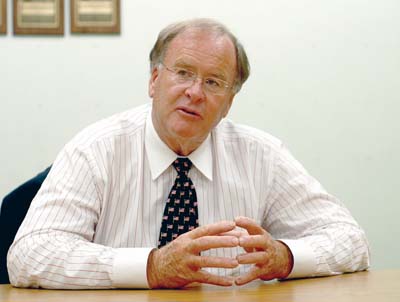
Congressman Sam Farr is realistic about his recently proposed
legislation to upgrade Pinnacles National Monument to federal park
status. With only 58 parks carrying the designation and a range of
areas throughout the country with bigger names
– Niagara Falls, Mount Rushmore and Mount St. Helens, to name a
few – he might have a tough time selling the legislation and
catapulting Pinnacles into park royalty.
”
We’ll have to cross that bridge when it comes,
”
Farr said in an interview with the Free Lance this week.
HOLLISTER
Congressman Sam Farr is realistic about his recently proposed legislation to upgrade Pinnacles National Monument to federal park status. With only 58 parks carrying the designation and a range of areas throughout the country with bigger names – Niagara Falls, Mount Rushmore and Mount St. Helens, to name a few – he might have a tough time selling the legislation and catapulting Pinnacles into park royalty.
“We’ll have to cross that bridge when it comes,” Farr said in an interview with the Free Lance this week. “Those are the fights we have to do. We’ll never get there if we don’t try. Whether we can be successful, we’re going to have to have support of a lot of folks, and particularly the parks department.”
On the flip side of the notion that other more recognizable parks might get consideration over Pinnacles, Farr also pointed out how many national parks – especially on the East Coast – are about the same size or smaller than Pinnacles, which encompasses about 25,000 acres.
While in Hollister for his town hall meeting Wednesday, the Carmel Democrat representing San Benito County responded to questions over the Pinnacles legislation, the federal water allocation to California farmers, the health care bill and the stimulus package.
Farr ‘always curious’ about name change
Most recently, Farr announced he had introduced the bill to upgrade Pinnacles from monument to park status, which mostly stands to increase visibility and tourism opportunities for the local attraction.
Farr noted how there has “always been interest” in upgrading Pinnacles since his congressional tenure began more than 15 years ago.
“And I was always curious about it and heard there were always roadblocks and financial issues,” he said. “Essentially, a national park, it’s like setting up a whole new administration of government, and during the Republican years, there was no interest in creating a national park.”
He chose this time to introduce the bill due to the “changeover in administration.” He said the bill could take a year and a half or so to get resolved.
“But we’ve got it started. You may fail, but you’ll never succeed without trying.”
Locally, Farr said there has been “an incredible range of buy-in to this from the chamber of commerce.”
“And I’ve been working with a group from the chamber who’s been trying to figure out how to promote tourism and how to upgrade tourism experiences in San Benito.”
Farr talked about tourism in the entire Central Coast area, with its broad range of attractions, and how “we’ve failed historically to ever market this area as a region because we’re kind of parochial in our thinking.”
“The least parochial of the thinkers has been the San Benito County chamber and their tourism bureau,” he said.
The upgrade is needed, he said, because “when you think of a monument, you think of something stuck in the ground.”
“It really has degraded the importance of the Pinnacles ecosystem. Now that it’s a condor release site, the only one in the country essentially owned by the National Park Service, we think we really have criteria to really upgrade. And frankly, the park service has helped us write the bill.”
Farr says law ‘protects the fish’
Another environmental issue prompting contention in the Central Coast and Central Valley regions has been debate over the federal water allocation – or lack there of – to California farmers and ranchers.
The federal government this year gave a 10 percent allocation of water – after an initial zero allocation, prompting widespread protests – largely due to drought conditions and concerns over a threatened, two-inch fish called the delta smelt prompting restrictions to water pumping.
Farr said there has to be a compromise between environmentalists and farmers, who argue the protections have cost thousands of jobs and millions of dollars in productivity.
He said there “isn’t the politics to just say dump the fish in favor of the farmers.”
“The only way to work it out is to work out a legal compromise that shows you can take more water without jeopardizing the fish. At the same time, I think a lot of farmers are thinking, ‘This is my livelihood.’
“I think we’ll survive and I think we’ll survive with some changes that are beneficial. It’s not just farming. It’s on top of the biggest recession in modern history.”
Asked where he stands on the issue, and he said that lawsuits “never get you a drop of more water.”
“I stand with the fact that there’s precedent laws on the books, and I don’t think farmers want to put all their eggs in one basket.”
As to whether he supports allocating more water, Farr had this to say: “Yes, there’s got to be better use of the water. I’ve heard the screams and cries but I think if you drive over to Los Banos today and drive up Interstate 5, you see an abundance of orchards looking very healthy. You see the lake looking pretty sick. There are patches of the valley that have survived this, so a lot of it is about water allocation, which is extremely, legally complicated.”
He went on: “There’s no winners in this. The only thing you’re going to do is have to build consensus with all the groups.”
For the rest of the story, including Farr’s responses regarding the health care bill and stimulus package, see the Free Lance on Tuesday. Below, see video coverage of Farr’s town hall meeting in Hollister.









